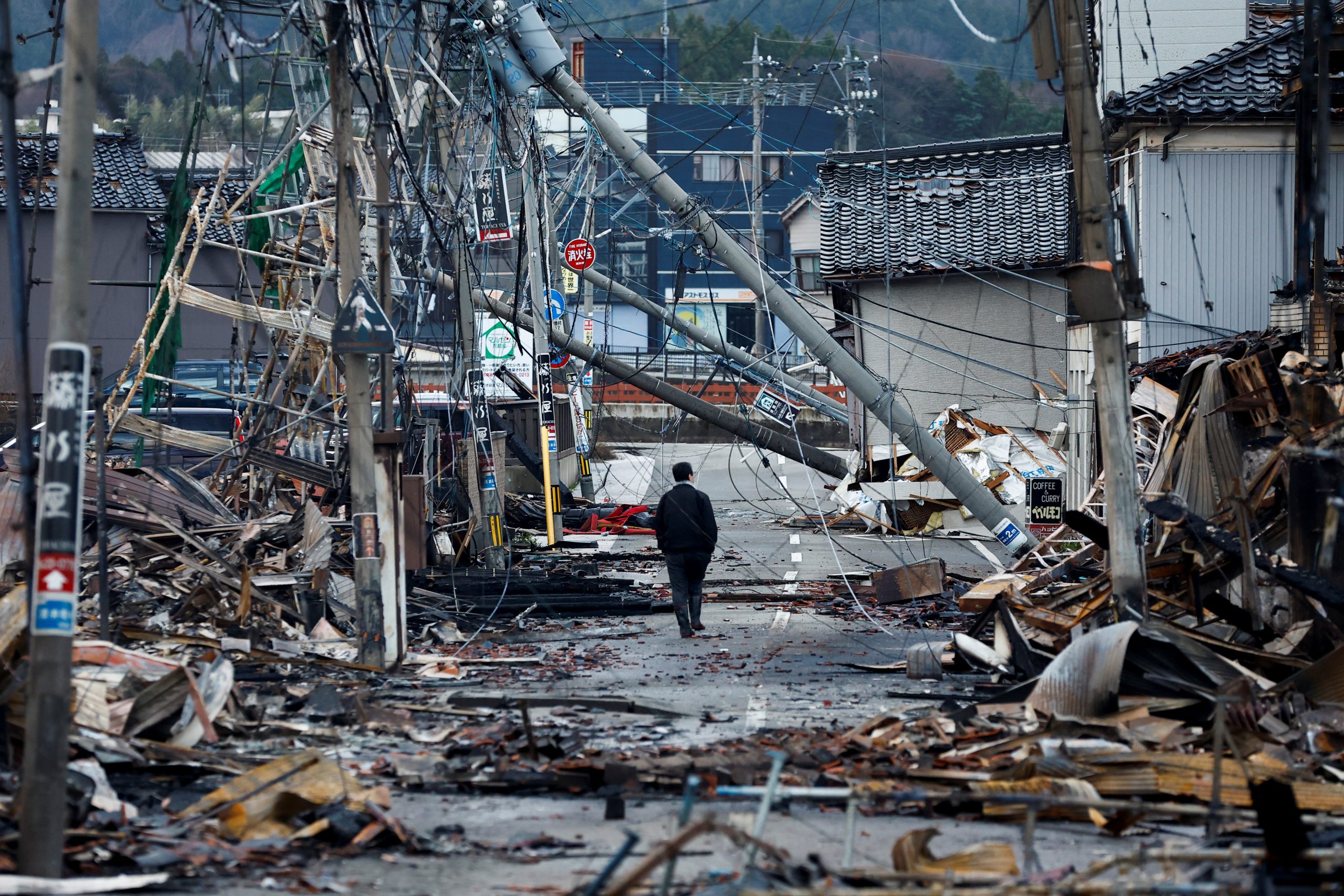2024-01-04 07:15:10

There were almost 100 chokepoints and blockages on prefectural roads (Reuters)
Tokyo, Japan:
Thousands of rescuers pressed on in their search for survivors of a New Year’s Day earthquake that killed at least 81 people in Japan, hoping to save as many as possible within a three day survival window that ends on Thursday afternoon.
“There are many people left behind in the collapsed buildings, waiting to be rescued,” Japanese Prime Minister Fumio Kishida said at a press conference.
“We will use all of our efforts to rescue as many people as possible by this evening, when 72 hours will pass since the disaster,” he said.
Survival rates drop off 72 hours after the quake, according to emergency responders.
Severed roads and the remote location of the worst-hit areas have complicated rescue efforts. Nearly 600 tremors have hit the Noto peninsula since the main quake, raising fears of further damage to infrastructure.
Three days since the disaster struck, material aid has trickled in but evacuees remain largely cut off from food, water, warmth, and communications amid freezing temperatures and bad weather, authorities have said.
The 3,000 meals and 5,000 bottles of water that were delivered as of Wednesday is not nearly enough for the 11,000 evacuees seeking aid in Wajima city, its mayor, Shigeru Sakaguchi, said at a regional disaster response meeting.
“First and foremost, it’s the road – severed roads are hampering not just aid supplies, but also the recovery of electricity, water, mobile signals and other lifeline infrastructures,” he said.
There were almost 100 chokepoints and blockages on prefectural roads, according to data released by Ishikawa prefecture on Thursday.
Mayors acknowledged some supplies are beginning to arrive but said they needed more. Basics such as internet access, medical supplies, and clean toilets were also lacking.
“Compared to other disasters the road situation into Wajima is very bad. I feel it’s taking longer than usual for assistance to arrive,” Shunsaku Kohriki, a medical worker who has assisted other disasters, told Reuters in Wajima city, where over half of the casualties were located.
“I think realistically speaking the evacuees will have to live in really tough conditions for a while yet,” he said.
No Running Water
Kyoko Kinoshita, 62, worried about the possible spread of the flu and COVID as she queued in line with a couple of hundred other survivors for food in Wajima.
“We have no running water. We cannot wash our hands after going to the bathroom,” she said.
“One of the babies at the evacuation centre is 3 weeks old and it looks like there is not enough water or milk for the baby either,” she added.
The government has pledged it will proactively provide supplies instead of waiting for official requests from local authorities, and has quintupled the number of Self-Defence Force members tasked with rescue operations since Monday.
Some aid has been delivered via sea instead of land, with coast guard boats reaching ports in Wajima and Suzu on Wednesday.
However, larger ships have been unable to dock in the bays of the Noto peninsual because the seabed had buckled from the earthquake, Ishikawa Governor Hiroshi Hase said on Thursday.
Business Impact
As Japanese businesses return from the New Year holidays, manufacturers are also gauging the impact of the quake on their production lines.
Display makers Japan Display and EIZO, as well as semiconductor firm Kokusai Electric, said they were repairing damaged factory facilities. Chip material maker Shin-Etsu Chemical said its plant in Niigata restarted part of its operations on Wednesday.
Tokyo Stock Exchange on Thursday observed a minute of silence on Thursday instead of ringing a bell to mark the opening of trade, out of respect for those who died in the earthquake and a separate accident at Tokyo Haneda airport where five Coast Guard members were killed en route to deliver aid.
Kishida pledged on Thursday to tap roughly 4 billion yen ($28 million) of the national budget for disaster relief.
(Except for the headline, this story has not been edited by NDTV staff and is published from a syndicated feed.)
japan quake rescuers challenges,japan quake rescuers race against time,japan earthquake
Source link
![]()



